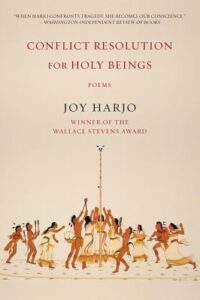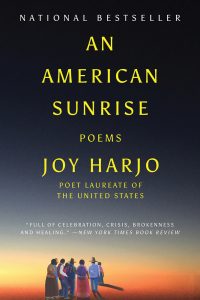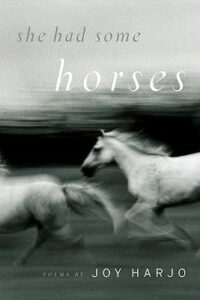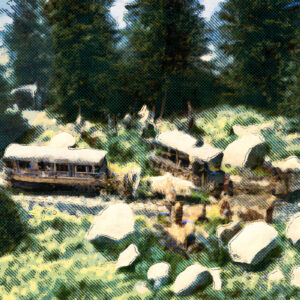Joy Harjo
Poems as Teachers | Episode 2
As appealing as it may sound, is it really possible to live in a world completely free of conflict? No. And since differences and disagreements are inevitable and natural, Joy Harjo gives ground rules in “Conflict Resolution for Holy Beings.” Her call to us echoes across time and space — a call to listen, to humility, to justice, and to recognizing the land, the living, the dead, the not-yet-living.
This is the second episode of “Poems as Teachers,” a special seven-part miniseries on conflict and the human condition.
We’re pleased to offer two sections of Joy Harjo’s longer poem, and invite you to read Pádraig’s weekly Poetry Unbound Substack, read the Poetry Unbound book, or listen back to all our episodes.
Guest
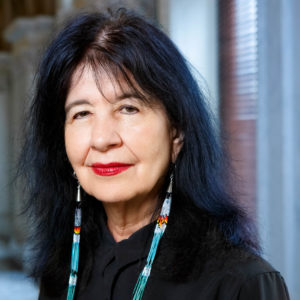
Joy Harjo is a member of the Muscogee Creek Nation and the 23rd Poet Laureate of the United States. She is the author of 10 books of poetry, including An American Sunrise, Conflict Resolution for Holy Beings, and She Had Some Horses, and the memoirs Crazy Brave and Poet Warrior. Her most recent poetry collection is Weaving Sundown in a Scarlet Light: Fifty Poems for Fifty Years. She’s also produced several award-winning albums of music, including her most recent, I Pray for My Enemies.
Transcript
Transcription by Alletta Cooper
Pádraig Ó Tuama: My name is Pádraig Ó Tuama and in my early twenties somebody said to me, “I think you’d be pretty good at being a conflict mediator.” And I was always interested in how it is that groups of people could learn to understand each other, sometimes simply for the purpose of understanding. Other times, trying to convince each other, or trying to address something that had gone wrong. I was really interested in helping people understand what is it that matters when we are stumbling over ourselves and each other in conflicts that occur. Training in conflict, you’re always learning new forms. There’s loads of different models. And the point in learning all of these forms is that they are like a spine, and a spine is not a static thing. A spine should be both strong and flexible. Perhaps a little bit like the form of a poem. I’ve spent many years learning different forms of conflict resolution practice, and I’ve never yet had a perfect conflict resolution experience. It always has to change and adapt and suit itself to what’s happening.
[music: “Praise the Rain” by Gautam Srikishan]
“Conflict Resolution for Holy Beings” parts 1 and 5 by Joy Harjo
“1. SET CONFLICT RESOLUTION GROUND RULES:
“Recognize whose lands these are on which we stand.
Ask the deer, turtle, and the crane.
Make sure the spirits of these lands are respected and
treated with goodwill.
The land is a being who remembers everything.
You will have to answer to your children, and their children,
and theirs—
The red shimmer of remembering will compel you up the
night to walk the perimeter of truth for understanding.
As I brushed my hair over the hotel sink to get ready I heard:
By listening we will understand who we are in this holy
realm of words.
Do not parade, pleased with yourself.
You must speak in the language of justice.
“5. ELIMINATE NEGATIVE ATTITUDES DURING
CONFLICT:
“A panther poised in the cypress tree about to jump is a
panther poised in a cypress tree about to jump.
“The panther is a poem of fire green eyes and a heart charged
by four winds of four directions.
“The panther hears everything in the dark: the unspoken
tears of a few hundred human years, storms that will break
what has broken his world, a bluebird swaying on a branch a
few miles away.
“He hears the death song of his approaching prey:
“I will always love you, sunrise.
I belong to the black cat with fire green eyes.
There, in the cypress tree near the morning star.”
[music: “Creatures of Myth” by Gautam Srikishan]
I’ve been in so many situations — formal conflict resolution settings and situations at work or situations with friends — where somebody says, “Let’s just set some ground rules.” And I had never, up until I read this poem by Joy Harjo, thought about the word “ground” in the context of “ground rules.” And she brings all of our attention to that: “Recognize whose lands these are on which we stand.” Right from the opening line of part one of “Conflict Resolution for Holy Beings” she’s saying that the land owns the land and that we as people have a particular duty to pay attention to the land.
This opening part, much of it is in the imperative. They are rules. There’s at least five of them: “Recognize whose lands these are on which we stand. / Ask the deer, turtle, and the crane. / Make sure the spirits of these lands are respected and / treated with goodwill.” And then, further on down, “Do not parade, pleased with yourself. / You must speak in the language of justice.” So the way that I think about this opening part is that it is five ground rules, paying attention to both the past and the future and being aware, holding the sense of time — the temporary experience of time — that we have right now and saying, know that you’re only one part of what’s come before and what’s coming after.
It’s interesting, in the context of a poem like this to be speaking so directly. Often, I think, contemporarily in poetry there can be some hesitation about using language like this that is really giving orders. And you can hear in Joy Harjo’s first section of this poem that she, too, wants to trouble that because there are these five orders, but then there’s this line where she includes herself, perhaps, as a recipient, “as I brushed my hair over the hotel sink to get ready I heard.” So I wonder who is it that’s speaking here? Is this the land speaking? There’s an invocation and a call to listen. There is a call to humility. “Do not parade please with yourself.” There is a call to a language of recognizing all the other living beings, a language of recognizing the dead and the not-yet living. It’s an extraordinary imagination of saying, “this is what we’re capable of.”
[music: “Angel Tooth” by Blue Dot Sessions]
A friend of mine was mediating a conflict once, and it was a conflict that had gone on in a workplace for a long time, two people who just couldn’t come to any kind of agreement. My friend, at one point, said to the two people, “Listen, I’ve got a bar of chocolate in my bag and it’s coming up to lunch. Why don’t you two take the bar of chocolate and walk and see what happens as you share the chocolate?” Anyway, an hour later they came back, and — this sounds naive to say, but it’s not naive to say it — they had found some way of understanding and comprehending each other’s point of view such that they had a new way of looking at things. And the new way of looking at things, I don’t think it came from the chocolate — even though I’m sure that didn’t get in the way — but probably where it came from is the fact that they walked. You literally, when you’re walking alongside each other, you’re not eyeballing each other. You’re looking at what’s on the road in front of you or on the street, or maybe you’ve got a nice view, or you can see some greenery. You’re using your body and you aren’t in a confrontational poise towards each other. You can also hold silence more easily, I think, and varying points of view becomes enormously more possible, when you’re walking alongside each other. So I always think of the extraordinary conflict intelligence in this line from the first section of Joy Harjo’s poem, “The red shimmer of remembering will compel you up the / night to walk the perimeter of truth for understanding.”
This poem contains within it the understanding that we are not just people sitting at tables staring at each other. We are living, breathing beings on the land with other living, breathing beings. And being on the land — walking, using our body as our entire selves, not just as the body that holds our brain — this can remind us who we are, too.
Conflict is an absolutely natural and necessary element in all of life. We know that conflict can be used for terror. And what we’re hoping, I think, is that conflict can be used in the way that Joy Harjo is putting it across: to remind us of “who we are in this holy / realm of words” in order for conflict to be used for the possibility of making something and understanding our place in land, among beings, and in time.
[music: “Into the Earth” by Gautam Srikishan]
For this episode, we’re only looking at sections one and five of a six-section poem called “Conflict Resolution for Holy Beings,” and the fifth one is called “Eliminate Negative Attitudes During Conflict.” And what’s so interesting is that it goes straight into this poetic, beautiful, powerful, depiction of a panther in a tree waiting for its prey. And in a certain sense, too, the recognition in the prey that it is singing its death song.
I’ve thought for a long time about why is this titled “Eliminate Negative Attitudes During Conflict?” I can only say the way that I read it these days, but I definitely do read it to say, this is perfectly natural for one animal whose well-being and life is dependent on it eating another. That isn’t a negative attitude for a panther to see its prey and see it only as its prey. But I’m not a panther and nor am I prey. And so, for me, there’s a narrative confrontation that happens in the depiction that Joy Harjo uses here by using beautiful language, poetic language to describe other beings and, in a certain sense, to say, we don’t have to live that way. We don’t have to live in a way where we see another person as our prey or that we have to act as the predator. That is not how human community flourishes, even if so often we’re reminded that human community veers towards that in the wars that we have in our own countries and between countries.
It’s so easy, really, to be caught up in the life cycles of the panther and the prey and to see those as the only things that are living. But there are other living beings here, too. There’s the cypress tree, which presumably will live longer than the panther, and there’s also the morning star, which presumably will live longer than the cypress tree. There’s also the land upon which the cypress tree grows. And so what she’s depicting is things of different life cycles and very definitely I think saying this is not humanity, while we will have much shorter life cycles than the morning star, of course, we do not need to be people who divide human beings into categories of predator and prey.
[music: “Arrival at Kirkenes” by Blue Dot Sessions]
“Conflict Resolution for Holy Beings,” this poem is called, and, in fact, it comes from a book that has the same title. And this poem has an epigraph from Norman Patrick Brown who was a Dineh poet and speaker. And the epigraph says, “I am the holy being of my mother’s prayer and / my father’s song.” And this, too, brings us into the imagination and, in a certain sense, the anthropology of this poem. This poem isn’t frightened of saying, we have to hold ourselves accountable. This poem isn’t frightened of saying, you need to be reminded of where you are, where you’ve come from, who will come after you. And also, this poem wants to assert again and again and again an anthropology of who we are. Holy beings. “I am the holy being of my mother’s prayer.” And towards the end of this, the first section of Joy Harjo’s poem, it says, “By listening we will understand who we are in this holy / realm of words”. And the question really is, how is it that I can act in correspondence with who it is I understand myself to be? And the imagination of this poem is, you can only understand yourself to be yourself in conversation with land, in conversation with ancestors, in conversation with the future, and in conversation with the language of justice.
[music:“Creatures of Myth” by Gautam Srikishan]
“Conflict Resolution for Holy Beings” parts 1 and 5 by Joy Harjo
“1. SET CONFLICT RESOLUTION GROUND RULES:
“Recognize whose lands these are on which we stand.
Ask the deer, turtle, and the crane.
Make sure the spirits of these lands are respected and
treated with goodwill.
The land is a being who remembers everything.
You will have to answer to your children, and their children,
and theirs—
The red shimmer of remembering will compel you up the
night to walk the perimeter of truth for understanding.
As I brushed my hair over the hotel sink to get ready I heard:
By listening we will understand who we are in this holy
realm of words.
Do not parade, pleased with yourself.
You must speak in the language of justice.
“5. ELIMINATE NEGATIVE ATTITUDES DURING
CONFLICT:
“A panther poised in the cypress tree about to jump is a
panther poised in a cypress tree about to jump.
“The panther is a poem of fire green eyes and a heart charged
by four winds of four directions.
“The panther hears everything in the dark: the unspoken
tears of a few hundred human years, storms that will break
what has broken his world, a bluebird swaying on a branch a
few miles away.
“He hears the death song of his approaching prey:
“I will always love you, sunrise.
I belong to the black cat with fire green eyes.
There, in the cypress tree near the morning star.”
[music: “Praise the Rain” by Gautam Srikishan]
Chris Heagle: “Conflict Resolution for Holy Beings” comes from Joy Harjo’s book of the same title. Thank you to W. W. Norton & Company and Joy Harjo who gave us permission to use her poem. Read it on our website at onbeing.org.
[music: “Praise the Rain” by Gautam Srikishan]
Additional support for this mini-season of Poetry Unbound comes from:
Civic (Re)Solve — building communities of civic empowerment.
Quiet — listen and finish listening.
And The Hearthland Foundation — committed to justice, equity and connection, one creative act at a time.
Poetry Unbound is: Gautam Srikishan, Eddie Gonzalez, Lucas Johnson, Kayla Edwards, Tiffany Champion, Cameron Musar, and me, Chris Heagle.
Our music is composed and provided by Gautam Srikishan and Blue Dot Sessions.
This podcast is produced by On Being Studios, which is located on Dakota land. Open your world to poetry with us by subscribing to our Substack newsletter. You may also enjoy Pádraig’s book, Poetry Unbound: Fifty Poems to Open Your World. For links and to find out more visit poetryunbound.org.
Books & Music
Recommended Reading
The On Being Project is an affiliate partner of Bookshop.org and Amazon.com. Any earnings we receive through these affiliate partnerships go into directly supporting The On Being Project.





